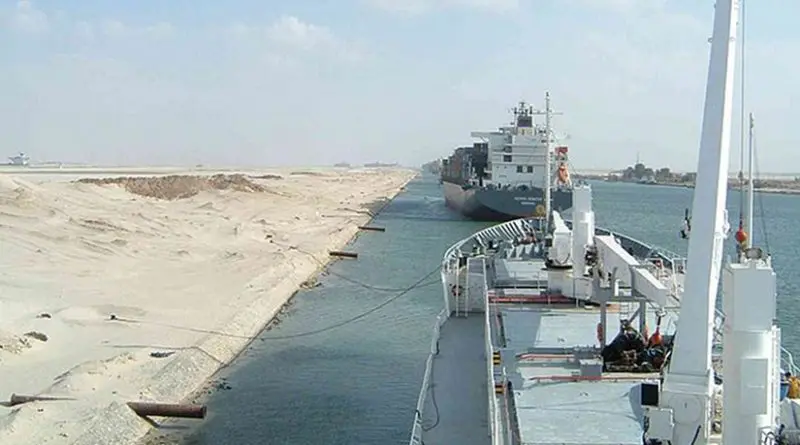EU Faces Prospect Of ‘Black Swan’ Shutdown Of Suez Canal
By EurActiv
The Egyptian crisis entered a new and potentially critical phase Tuesday as thousands of Suez Canal service workers began an indefinite strike two weeks after protests against the Mubarak regime began.
Some reports say that between 5-7% of Europe’s oil consumption transits the waterway daily. If it is cut off, the effect on prices and supplies could be felt quickly.
Egypt’s oldest daily newspaper Al Ahram yesterday reported in its online edition that 6,000 workers in Suez, Port Said and Ismailia had begun an indefinite strike and sit-in in protest against poor wages and deteriorating health and working conditions.
Bloomberg news agency quoted Mohamed Motair, director of companies at the Suez Canal Authority, as saying that the workers were not involved in operations, although they belonged to several related service companies.
“This doesn’t have anything to do with Suez Canal traffic and the canal is operating normally,” Motair said.
But the news could alarm markets and European policymakers alike, and will likely be welcomed by pro-democracy activists in Cairo’s Tahrir Square.
The US Energy Department classifies the Suez Canal as one of a handful of World Oil Transit Chokepoints and events there can have a disproportionate effect on oil prices, which last week hit $100 a barrel on fears about the Canal’s security.
Stephen Schork, an oil market analyst whose influential newsletter can reportedly move the price of oil, said that a shutdown of the Suez would be a “black swan” event.
“What makes this so dangerous is that OPEC does not control [Suez] and it can steady [prices] by putting barrels onto the market,” he told EurActiv.
“It assuaged the market a week ago when oil in Europe was trading above $100 a barrel. So this takes a card away from OPEC to help quell any upwards move on price now.”
Roughly four million barrels of oil pass through Egypt’s Suez Canal by tanker and pipeline traffic every day.
8% of all the world’s seaborne trade and 2.6% of global production passes through the Canal, which at its narrowest is only 1,000 feet wide.
Rosemary Hollis, ex-director of the Royal Institute of International Affairs and current professor of Middle East Studies at City University, London, stressed that the Egyptian demonstrators had so far tried to keep their revolt an internal affair.
“I’m not clear what it is that they would hope to achieve by a strike,” she told EurActiv.
But she added that a shutdown could occur “if they thought that the only thing keeping Mubarak in power was the US and that they could hurt US interests and grab the world’s attention by making a point like that”.
A week ago, a leading member of Egypt’s Muslim Brotherhood, Muhammad Ghannem, reportedly told Al Alam newspaper that the Suez Canal should be closed immediately.
The Brotherhood is the biggest and best-organised of Egypt’s opposition parties but, although it says it is committed to pluralism and democracy, its Islamist agenda frightens many in the West.
Maya Kocijancic, a spokesperson for the EU’s foreign policy chief, Catherine Ashton, told EurActiv that the High Representative for Foreign Affairs was hoping to visit Egypt after a trip to Tunisia next week.
Dignitaries that Ashton intends to meet include “representatives of the Egyptian government and most likely Vice-President Suleiman, and probably different political forces in Egypt,” she said.
Kocijancic was unable to confirm which opposition groups Ashton would talk to, “but we’re looking into arrangements,” she said.

